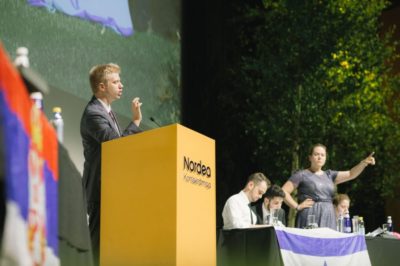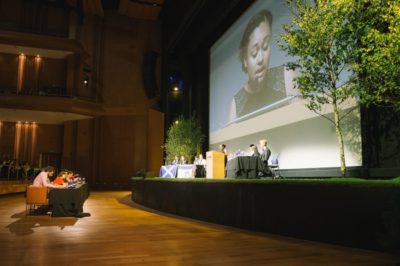Tallinn EUDC 2017: Tel Aviv and Glasgow are the new European Champions
The European Universities Debate Championship 2017, taking place in Tallinn, have come to an end. On the day of the finals both the last four teams of the Open track and the English as a Second Language (ESL) track came together at the Nordea Concert hall for the two finals.

The ESL final – © Mihkel Leis, mihkelleis.ee
Taking place first was the ESL final. The teams competing were Tartu A (Kätliin Lember, Rauno Kiviloo) in Opening Government, Tel Aviv B (Tom Manor, Noam Dahan) in Opening Opposition, Belgrade A (Ilija Ivanišević, Janko Djordjevic) in Closing Government and Leiden B (Sharon Gil, Emma Lucas) in Closing Opposition. Adjudicating were Sharmila Parmanand (chair), Rebecca Irvine, Ameera Natasha Moore, Duncan Crowe, Gareth Williams, Jamie Jackson and Benji Kalman. The ESL final had the motion: THB that Western European states at high risk for terror attacks should implement ‘state of emergency’ laws.
The jury unanimously voted for Tel Aviv B to be the new ESL champions.

The Open final – © Mihkel Leis, mihkelleis.ee
Following the ESL final, the Open final had Tel Aviv B (Tom Manor, Noam Dahan) – who managed to make their way into both finals as an ESL team – in Opening Government, Oxford B (Sophie Large, Teck Wei Tan) in Opening Opposition, Glasgow UU A (Bethany Garry, Owen Mooney) in Closing Government and Oxford C (Debi Ogunrinde, Toby Tricks) in Closing Opposition. Adjudicating were Mifzal Mohammed (chair), Olivia Sundberg Diez, Thomas Simpson, Senna Mattoug, Kallina Basli, Stefan Siridžanski and Daan Welling. Motion of the Open final was: TH as the Kremlin would commemorate the 1917 Russian Revolution as a tradegy rather than a triumph for the nation. (+ Info text)
In a 5:2 split decision the jury voted for Glasgow to be the new Open champions.
The final day also included the announcement of EUDC’s best speakers which – just like the announcement of the winning teams – took place after the dinner and some entertainment. The top speakers of Tallinn EUDC are:
Open:
1. Bethany Garry (GUU A) – 750 pts
1. Matt Hazell (Cambridge B) – 750 pts
3. Owen Mooney (GUU A) – 749 pts
3. Darion Hotan (KCL A) – 749 pts
5. Toby Tricks (Oxford C) – 748 pts
6. Katherine Dunbar (Cambridge B) – 746 pts
7. Raffy Marshall (Oxford A) – 745 pts
8. Nish Hedge (Edinburgh A) – 742 pts
9. Floris Holstege (Leiden A) – 741 pts (ESL)
10. Srishti Krishnamoorthy-Cavell (Cambridge C) – 740 pts
10. Teck Wei Tan (Oxford B) – 740 pts
ESL:
1. Floris Holstege (Leiden A) – 741 pts
2. Tom Manor (Tel Aviv B) – 737 pts
3. Emma Lucas (Leiden B) – 732 pts
4. Roel Becker (Leiden A) – 728 pts
5. Sharon Gil (Leiden B) – 727 pts
6. Monica Forman (Tel Aviv A) – 724 pts
6. Noam Dahan (Tel Aviv B) – 724 pts
8. Lucía Arce (Sheffield A) – 718 pts
9. Ilija Ivanišević (Belgrade A) – 715 pts
9. Ido Kotler (Tel Aviv A) – 715 pts
The motions of Tallinn EUDC 2017:
R1: This house believes that the US should ban extremist groups (e.g. the KKK and neo-nazi groups).
R2: This house believes that the WTO should allow developing countries to impose policies aimes at protecting domestic industries, even at the expense of harming international trade.
R3: This house regrets the rise of the ‚Sharing Culture’ (a culture which encourages the frequent posting of both mundane and intimate details of one’s life on social media platforms, and the commenting on and reacting to others posts of this nature).
R4: This house believes that states should significantly fund female-only tech companies.
R5: This house, as Israel, supports the Jewish People’s Intelligence Service Doctrin.
Info text: The Jewish People’s Intelligence Service Doctrin is a proposal which states that the Israeli Intelligence service should have a significant responsibility not only to Israeli’s citizens’ security, but also to the security to the Jewish communities abroad. If this doctrin were adopted, Israel would use significant resources and launch potentially violent operations in order to keep Jewish people safe internationally.
R6: This house supports universities treating students like customers (e.g. by allocating significant ressources to improving students’ lifestyles, and granting students influence over university decisions and the content and delivery of the course curricula).
R7: This house believes that Western medical institutions should neither cooperate with, nor use the data produced by, non-Western medical institutions that do not meet Western standards on human clinical trials.
Info text: Non-Western medical institutions are becoming increasingly competitive within the field of human clinical trials and now constitute a major share of the world’s scientific output. These trials operate under local medical standards that are less stringent than Western ones.
R8: This house believes that LGBT groups should actively seek to include Side B christians.
Info text: Side B christians are christians who identify as experiencing same sex attraction but nevertheless believe that homosexual sex is sinful, and therefor attempt to remain celibate.
R9: This house supports the creation and use of Lethal Autonomous Robots.
Info text: Lethal Autonomous Robots are fully autonomous military weapons that can select and engage targets without human intervention.
Open PDQF: This house believes that the US should reverse the ‘Pivot to Asia’ strategy.
ESL QF: This house believes that having children is immoral.
Open QF: This house, as women’s rights groups in India, would adopt violent female goddesses as prominent symbols.
Info text: In Hinduism, there exist prominent goddesses that represent liberation through force, violence, aggression and power. An example is Kali, who is often portrayed wearing a garland of skulls of the men she has killed around her neck and standing on her lover, the Hindu God Shiva, who lies calm and submissive beneath her.
ESL SF: This house would allow local governments to issue immigration permits that grant access to Defined Permit Services in the local area only.
Info text: Defined Permit Services include access to the purchasing or renting of property, employment, and government services such as education, healthcare and welfare.
Open SF: This house regrets the mass deregulation of the financial sector.
Info text: Since the 1980s, the financial sector has grown rapidly in many developed economies, with mass deregulation serving as a major driver. As the sector has grown, the number of people employed in the industry, and the variety and complexity of financial products have increased.
ESL final: This house believes that Western European states at high risk for terror attacks should implement ‘state of emergency’ laws.
Info text: ‘State of emergency’ laws temporarily grant more powers to the executive and law enforcement agencies. Examples include warrant-less property searches and house arrests, and using electronic tagging for the purposes of surveillance
Open final: This house as the Kremlin would commemorate the 1917 Russian Revolution as a tradegy rather than a triumph for the nation.
Info text: The 1917 Revolutions overthrew the Tsarist regime and were a precursor to the creation of the Soviet Union. In Russia, perception of the revolutions varies and the Kremlin does not have an official position.
Reporting from Tallinn for the Achte Minute were Lennart Lokstein, Helena Hecke, Jan-Gunther Gosselke, Craig McDonald and Saskia Höfer.
lok./jm.





